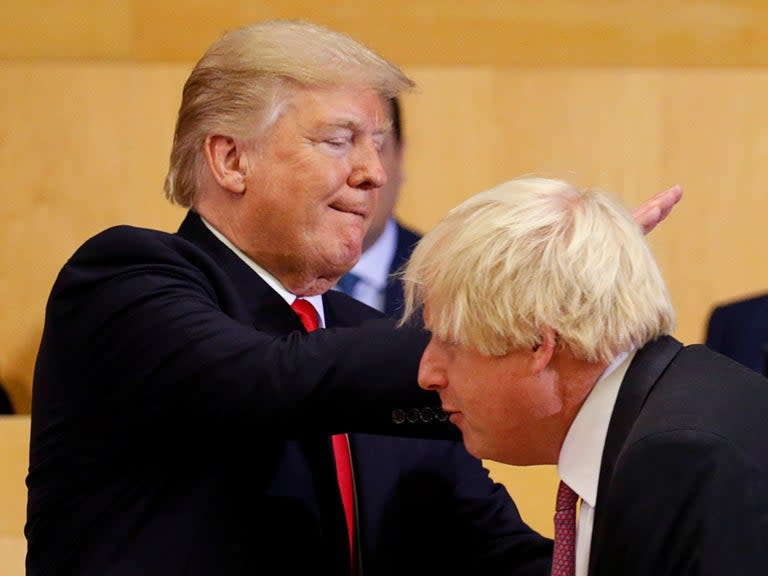If Boris Johnson follows in the footsteps of Trump’s ‘loyalty first’ politics, we’re all doomed
In Sunday’s issue of The Independent it was stated that Boris Johnson is naming certain MPs as likely ministers in the event of winning the Tory leadership contest – in my view, in an attempt to show that he is not a British Donald Trump. But for those of us who must live with the American original, such nominations do not evoke the desired reaction.
The main qualification for keeping one’s job as part of the Trump administration appears to be more and more loyalty to Trump personally as well as his vision for his moment.
Of the four government departments considered the most high level and vital to government functions, only one – the treasury – has kept its secretary that was confirmed at the start of the Trump administration
The other three – state, defence, and justice – have all changed at least once when the holders of those offices stepped down or were fired following clashes with Trump. In the same boat are numerous other administration officials too numerous to name.
Should Johnson follow this path, as the leader in Sunday’s edition suggested, it is not any way to run a government. We are having all sorts of problems with this loyalty-first model of governing, something Johnson will likely discover should he continue down this lane.
He will probably have to install the same model of revolving doors on ministerial offices that Trump is presently using in Washington. Trump could advise Johnson on how this should be done. In this arena alone, at least, he is an expert.
Gannon Sugimura
Virginia
A reminder for president Trump
When Trump went to Scotland there was one protest sign that said it all.
“Your maw was an immigrant.”
Nuff said.
John Sinclair
Pocklington
Tony Blair’s irreparable reputation
I too was an enthusiast for Tony Blair 25 years ago having lived through the “infantile leftism” of the Labour Party in the 1970s and early 1980s (“A quarter of a century on, Tony Blair’s dream has turned to nightmare”).
John Rentoul is right about Blair’s misjudgements on Iraq, where he failed to understand a real shift in the country’s appetite for foreign adventures. It is also true that his decision not to delay access to the United Kingdom to citizens of the new EU accession nations in 2004 caused disquiet due to competition for lower-paid jobs.
However, successive governments’ failures to support communities whose local economies had never recovered from the Thatcherite policies of the 1970s and 1980s, have to be added to the mix. The low-paid in parts of Britain found themselves competing with new eastern European immigrants, and while this mattered little in London, it mattered greatly in the northeast, and elsewhere.
Historically, Blair’s biggest failure was not to implement the 1997 manifesto promise of a referendum on electoral reform. If a dominant Labour Party had reformed electoral politics and implemented a system of proportional representation when it most certainly could, we would have a very different political landscape today. Winner-takes-all elections are at the root of Britain’s political failures.
Blair had the opportunity to change Britain for the better but failed to deal with the democratic disasters that first-past-the-post elections repeatedly inflict on our increasingly disunited kingdom. For this alone, his reputation is forever tarnished.
Chris King
London N3
The UK’s role in Iran-US tensions
Once again, the United Kingdom is in danger of being drawn into an impossible conflict to maintain one-sided links with the United States. Surely the recent history of the two ill-considered and drawn-out wars in Afghanistan and Iraq, which cost thousands of lives and billions of pounds to achieve nothing but an acceleration of Britain’s global decline, should be a clear message of experience.
But with a team of ministers in Westminster whose competence extends little beyond the mismanagement of basic social services, this is unlikely. It comes at the worst and best times for Britain. At worst, we will be engaging with an ally with the most incompetent and volatile administration ever just as we are about to get the least capable prime minister ever, who does not have the sense not to try proving himself as a latter-day Churchill, something that he is not and never will be.
At best, it is a portend of what will be a regular occurrence of obligation in support of US foreign policy in any trade deal, for which we will be simply a subjugated expendable auxiliary.
Matt Minshall
Norfolk
The Stena Impero is Swedish-owned. Why is it a British problem? The crew aren’t all British.
We have naval ships in the area. Why are they not protecting vessels from a few men in dinghies? Are they just out for a cruise? In any case, we should keep far away from US problems.
Michael Pate
Preston

 Yahoo News
Yahoo News 

